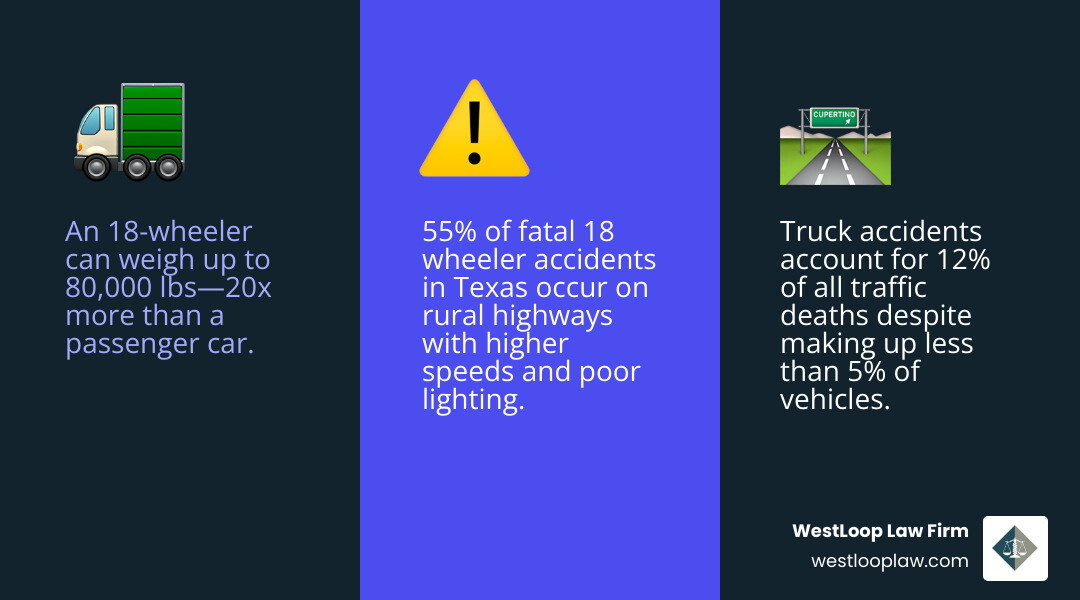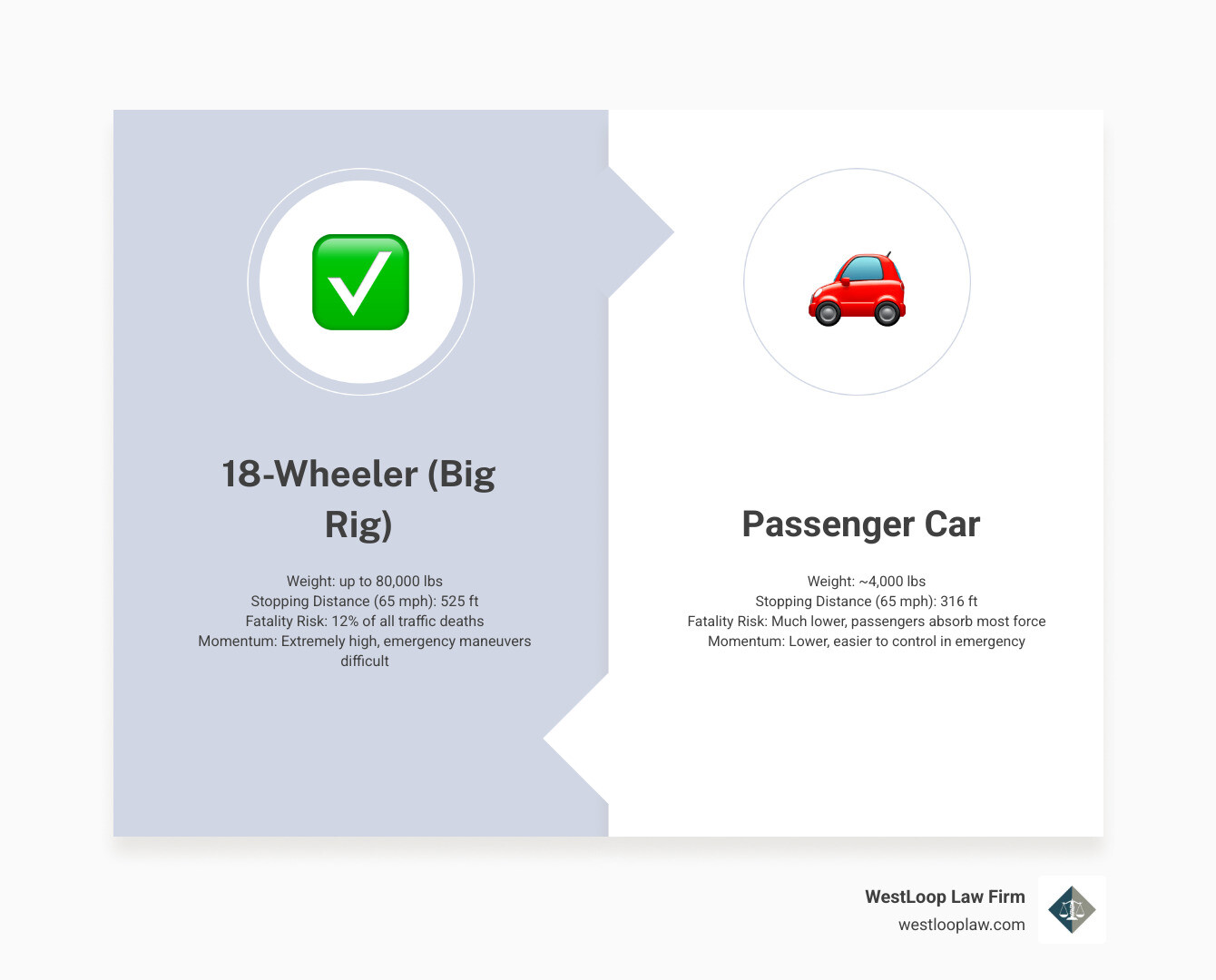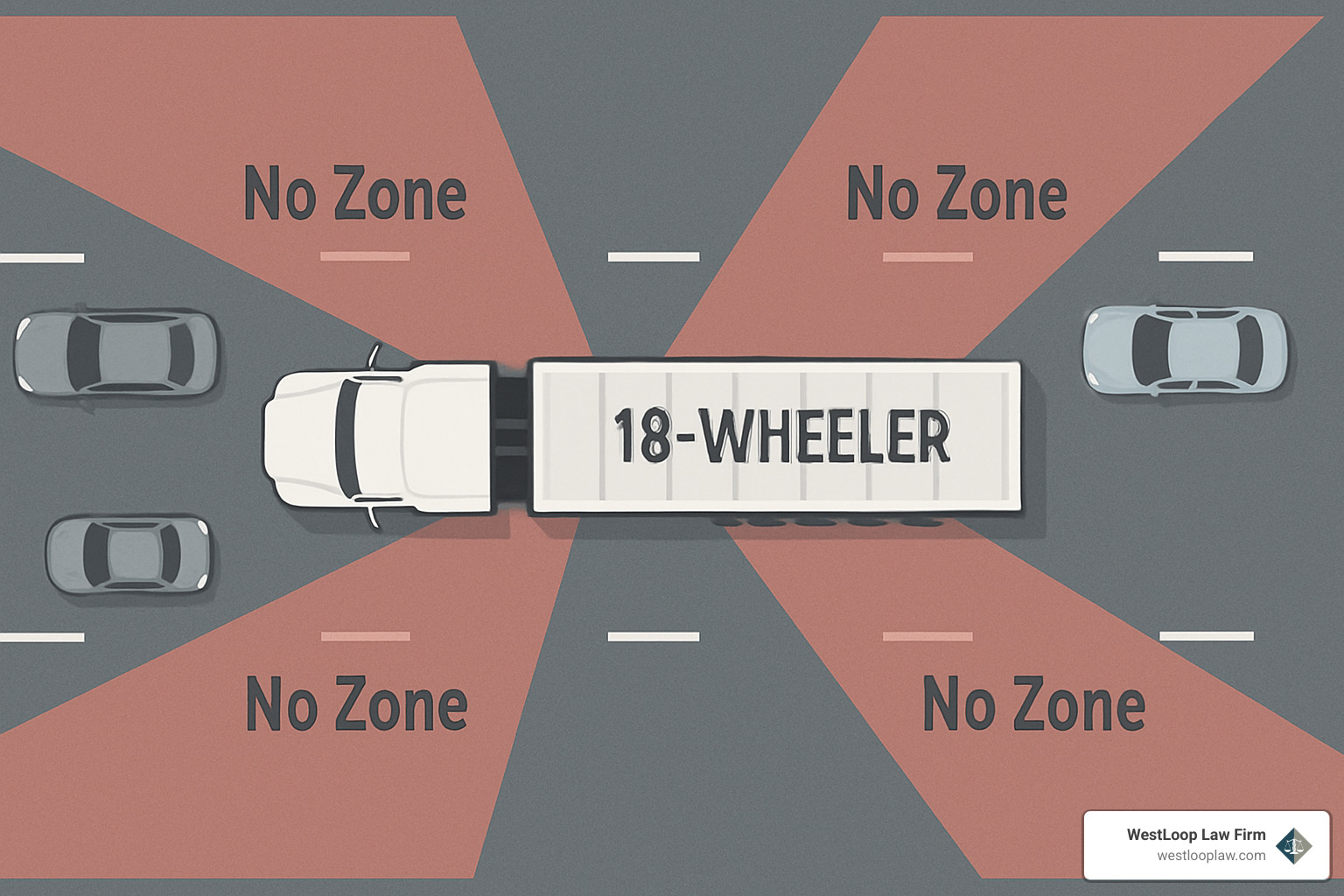Why 18 Wheeler Accidents Demand Your Immediate Attention
An 18 wheeler accident can change your life in seconds. These massive collisions involving commercial trucks are among the most devastating crashes on Texas roads, often resulting in catastrophic injuries, extensive property damage, and complex legal battles.
Key Facts About 18 Wheeler Accidents:
- Fatal Impact: In 2023, Texas recorded 12,542 truck accidents resulting in 563 fatalities
- Weight Disparity: Fully loaded trucks weigh up to 80,000 pounds vs. 4,000 pounds for passenger cars
- Higher Stakes: Truck accidents account for 12% of all traffic fatalities despite trucks being less than 5% of registered vehicles
- Driver Error: Up to 40% of commercial truck accidents are caused by distracted driving
When a semi-truck driver recently fell asleep at the wheel on Interstate 20 near Terrell, the resulting crash killed six people and injured several others. The 27-year-old driver now faces multiple manslaughter charges – a reminder that these accidents often involve criminal consequences beyond civil liability.
What makes these crashes so dangerous? The physics are brutal. An 18-wheeler traveling at highway speeds carries exponentially more force than a passenger vehicle. When things go wrong, occupants of smaller vehicles represent 7 out of 10 fatalities in large truck crashes.
This guide covers everything you need to know about 18 wheeler accidents in Texas – the leading causes, your legal rights after a crash, the claims process, and how to protect yourself and your family.
Understanding the Scale of Big-Rig Crashes
When we talk about an 18 wheeler accident, the numbers paint a clear and worrying picture. In 2022, the United States saw 4,985 fatal truck crashes – up 3% from 2021 and the highest yearly total since 2005. Over 117,000 people were injured in truck-related accidents nationwide.
Texas sits at the top of these grim statistics. Though large trucks make up less than 5% of vehicles on the road, they’re involved in over 13% of all fatal crashes. That’s a disproportionate risk that means Texans are more likely than most to be seriously affected by a big-rig collision.
The danger comes down to simple physics. A fully loaded 18-wheeler weighs up to 80,000 pounds compared to a 4,000-pound car. The smaller vehicle simply can’t withstand the force – like a bowling ball slamming into a ping-pong ball.
This massive weight difference creates major safety challenges. 18-wheelers need 20% to 40% more room to stop than a regular car. Their sheer momentum makes quick turns or emergency stops almost impossible. When a crash happens, the force is devastating – most fatalities are the people in the smaller vehicles.
More than half – 55% of fatal truck wrecks occur on rural roads. Poor lighting, narrower highways, higher speeds, and longer waits for emergency help all add up to greater risk.
Distracted driving is a huge issue, estimated as a factor in up to 40% of all commercial truck accidents. That covers everything from texting, fiddling with GPS devices, eating behind the wheel, or simply losing focus due to fatigue.
For the latest numbers, check out the latest statistics on large trucks.
Understanding these facts is the first step in protecting yourself and your loved ones from the dangers of an 18 wheeler accident.
Top Causes & Smart Prevention Strategies
Understanding what causes 18 wheeler accidents can literally save your life. These crashes follow predictable patterns that we can learn to recognize and avoid.
Driver fatigue tops the list as the most dangerous factor. Picture a truck driver who’s been on the road for 10 hours straight, fighting to keep his eyes open while hauling 80,000 pounds of cargo at highway speeds.
Distracted driving comes in a close second, accounting for 40% of all commercial truck accidents. Other major culprits include mechanical failures like brake malfunctions, improper cargo loading, and speeding – which becomes exponentially more dangerous when you need the length of two football fields to stop.
You have more control over your safety than you might realize. Respecting the “No Zone” – those massive blind spots around trucks – is your first line of defense. One-third of all car-truck crashes happen when smaller vehicles are invisible to the truck driver.
Never tailgate a truck. That bumper sticker saying “If you can’t see my mirrors, I can’t see you” is a life-saving reminder. When you need to pass a truck, do it decisively but safely. Don’t linger alongside where the driver can’t see you.
Be patient at intersections. Trucks need extra time and space to turn. Trying to squeeze past a turning truck is one of the fastest ways to end up in a tragic accident.
For specific accident scenarios, check out our guide on 5 Common Causes of Truck Accidents.
Driver Fatigue & Hours-of-Service Rules
Driver fatigue is the biggest threat on our highways for 18 wheeler accidents. Federal Hours-of-Service (HOS) rules limit how long truck drivers can be behind the wheel. Drivers can only drive for 11 hours maximum after taking 10 consecutive hours off duty, within a 14-hour window after coming on duty, with a 30-minute break after 8 hours of driving.
The problem? These rules only work if people follow them. Research shows 28% of commercial drivers suffer from sleep apnea, and logbook fraud remains persistent.
The devastating I-20 crash near Terrell? The driver admitted to falling asleep, killing six people. He now faces multiple manslaughter charges – a stark reminder that fatigue-related accidents can lead to criminal prosecution.
For detailed regulations, the FMCSA provides comprehensive resources.
Technology & Training Prevention
Technology is helping prevent 18 wheeler accidents before they happen. Modern trucks increasingly feature Automatic Emergency Braking (AEB), lane departure warnings, blind spot monitoring, and forward collision warning systems.
Driver monitoring has improved with dashcams, fatigue detection systems, and GPS tracking. The human element remains crucial through cargo securement training, defensive driving courses, and regular refresher training.
Trucking companies that fail to implement these safety systems may face increased liability in court – a crucial factor in determining fault and compensation.
After an 18 Wheeler Accident: Your Legal Roadmap
If you’ve been involved in an 18 wheeler accident, your immediate actions can significantly impact your safety, health, and legal rights.
Immediate Steps at the Scene:
- Ensure Safety First – Move to safety, turn on hazard lights, call 911 immediately
- Document Everything – Take photos of all vehicles, damage, road conditions, and injuries
- Gather Information – Collect driver’s license, insurance info, trucking company details, and DOT numbers
- Seek Medical Attention – Accept evaluation even if you feel fine; adrenaline can mask serious injuries
Important Legal Considerations:
Never admit fault or make statements about the accident’s cause. Multiple parties may be liable, including the truck driver, trucking company, cargo loaders, truck manufacturers, and maintenance contractors.
For detailed guidance, visit our resource on What to Do if You’re Hit by a Truck in Houston, TX.
Reference the FMCSA pocket guide for federal trucking regulations.
Preserving Evidence & Building Your Case
18 wheeler accidents generate vast amounts of time-sensitive evidence that can make or break your case.
Critical Evidence Sources:
- Electronic Data: Black box data, GPS records, Electronic Logging Devices (ELDs), dashcam footage
- Physical Evidence: Vehicle damage, skid marks, debris patterns, road conditions
- Documentation: Driver logs, inspection reports, maintenance records, employment records
- Witness Statements: Time-critical interviews before memories fade
In the recent I-20 crash case, witness testimony proved crucial, with one witness describing the “incredible” sound of impact – invaluable for establishing liability and demonstrating crash severity.
Working With Authorities & Insurers
18 wheeler accidents involve multiple investigating agencies and insurance companies.
Investigation Process:
- Texas Department of Public Safety (DPS): Conducts investigations, toxicology testing, issues crash reports
- Federal Motor Carrier Safety Administration (FMCSA): Reviews compliance, investigates violations, maintains safety ratings
Insurance Considerations:
Commercial trucks carry much higher insurance limits – often $1 million or more. Multiple companies may be involved: primary liability, excess/umbrella coverage, cargo insurance, and non-trucking liability.
Critical Deadlines include claim notification, evidence preservation, medical treatment documentation, and legal consultation. Insurance companies dispatch investigators within hours to minimize exposure.
Claim Process & Compensation Breakdown
Understanding compensation in 18 wheeler accident cases helps victims know what to expect. These cases often involve significantly higher settlements due to injury severity and commercial vehicle involvement.
Types of Damages Available:
Economic Damages:
- Medical expenses (current and future)
- Lost wages and earning capacity
- Property damage
- Out-of-pocket expenses
Non-Economic Damages:
- Pain and suffering
- Loss of enjoyment of life
- Loss of consortium
- Mental anguish
Punitive Damages:
Awarded in cases involving particularly reckless behavior to punish defendants and deter similar conduct.
Settlement Factors:
- Severity of injuries
- Extent of property damage
- Clear liability evidence
- Insurance coverage limits
- Emotional impact
- Quality of legal representation
Calculation Methods:
Non-economic damages often use a multiplier method where economic damages are multiplied by 1.5 to 5, depending on injury severity.
For comprehensive guidance, visit Navigating Your Claim with a Houston Truck Accident Attorney.
Calculating Losses & Negotiating Payouts
Medical Bills and Future Care:
18 wheeler accidents often result in catastrophic injuries requiring extensive treatment analysis including emergency care, surgery, rehabilitation, medications, and life care planning.
Lost Wages and Earning Capacity:
- Actual lost wages during recovery
- Long-term reduced earning ability
- Lost benefits and bonuses
- Reduced career advancement opportunities
Policy Limits and Coverage:
Commercial trucking policies typically range from $750,000 to several million dollars, including primary coverage, excess policies, and multiple defendant coverage.
Trial vs. Settlement Considerations
Most 18 wheeler accident cases settle out of court.
Settlement Advantages:
- Faster resolution
- Guaranteed outcome
- Lower costs
- Privacy
- Reduced stress
Trial Considerations:
- Higher potential awards
- Public accountability
- Precedent setting
- Complete investigation
Mediation Process offers a cost-effective alternative with neutral facilitators and confidential proceedings.
Litigation Timeline typically includes 6-12 months of findy, expert witness preparation, motion practice, 1-2 week trials, and potential appeals.
Frequently Asked Questions about 18 Wheeler Accident Claims
When dealing with an 18 wheeler accident, questions flood your mind at the worst possible time. Let’s address the most important questions to help you know what to expect.
What should I do immediately after an 18 wheeler accident?
The moments after an 18 wheeler accident can determine your entire case outcome.
Safety comes first. Call 911 immediately, even for seemingly minor accidents. Get out of traffic safely and turn on hazard lights. Set up flares if available, but don’t endanger yourself.
Document everything. Use your phone camera to photograph all vehicles, damage, road conditions, and the truck’s DOT number and license plate. This information is crucial for identifying the trucking company and insurance.
Gather information from all parties – driver’s licenses, insurance details, trucking company information. Get witness contact information and brief statements.
Accept medical evaluation even if you feel fine. Adrenaline masks injury symptoms. What feels minor today could be serious tomorrow. Medical documentation protects your health and legal rights.
Never admit fault or discuss the accident’s cause with anyone except police. Even saying “I’m sorry” can be twisted into guilt admission later.
How long do I have to file an 18 wheeler accident claim?
Texas law gives you exactly two years from the accident date to file a personal injury lawsuit. This applies to both personal injury and property damage claims. Wrongful death claims have two years from the death date.
The “findy rule” might extend this deadline in rare cases where injuries aren’t immediately apparent, but this exception is limited and difficult to prove.
Some situations have shorter deadlines involving government vehicles or property. Claims involving minors work differently – the statute usually doesn’t start until the child turns 18.
Waiting anywhere close to two years is a huge mistake. Evidence disappears quickly, witnesses move away, and trucking companies are only required to keep certain records for limited periods.
Insurance companies have their own notification deadlines much shorter than the legal filing deadline. Missing these can seriously hurt your case.
Contact an attorney immediately. Don’t wait to see how you feel or whether insurance companies will be fair.
Who can be held liable in a big-rig collision?
18 wheeler accidents can involve multiple liable parties, each with separate insurance coverage.
The truck driver might be liable for speeding, fatigue, distracted driving, or violating hours-of-service regulations. Criminal behavior like DUI significantly strengthens your case.
The trucking company often bears responsibility for negligent hiring, inadequate training, pressuring drivers to violate safety regulations, or failing to maintain vehicles properly.
Cargo loading companies can be liable for improper loading, overweight loads, or inadequate cargo securing – especially common in rollover accidents.
Parts manufacturers might be liable for defective components causing brake failures, tire blowouts, or steering malfunctions.
Maintenance contractors can be responsible for improper repairs or failing to identify safety issues during inspections.
Government agencies can be liable for poor road design, inadequate signage, or dangerous construction zones.
Each liable party typically carries separate insurance, significantly increasing total compensation available but also meaning you’re fighting multiple insurance companies – why professional legal representation is crucial.
Conclusion
When an 18 wheeler accident turns your world upside down, you’re facing more than just physical injuries and property damage. These crashes create a perfect storm of medical bills, lost wages, insurance battles, and legal complexities that can overwhelm families.
The statistics paint a clear picture: truck accidents are different. They’re more severe, more complicated, and carry higher stakes than typical car crashes. With fully-loaded trucks weighing 20 times more than passenger vehicles and carrying insurance policies worth millions of dollars, these cases demand focused knowledge and immediate action.
Time is your biggest ally or worst enemy after a truck accident. Evidence disappears quickly – black box data gets overwritten, witnesses move away, and trucking companies start building their defense within hours. Texas’s two-year statute of limitations might seem generous, but waiting even weeks can seriously damage your case.
At WestLoop Law Firm, we’ve walked alongside countless families through these difficult journeys. We understand how overwhelming it feels dealing with catastrophic injuries while insurance adjusters call with lowball offers. Our combined experience in personal injury and probate law means we can handle every aspect of your case, whether you’re fighting for fair compensation or dealing with tragic loss.
The path forward doesn’t have to be traveled alone. While trucking companies have teams of lawyers and investigators working to minimize liability, you deserve equally experienced advocates fighting for your rights. We know how to preserve critical evidence, identify all liable parties, and build compelling cases that insurance companies take seriously.
Your recovery depends on decisions you make in these crucial early days. Don’t let this window close while you’re figuring out what happened. The consultation is free, but the peace of mind from knowing experienced professionals are protecting your interests is priceless.
Contact our experienced team at WestLoop Law Firm today. We’re here to handle legal complexities while you focus on healing and getting your life back on track. Visit our Houston Trucking Accident Lawyer page for a free case review today.
You didn’t choose this situation, but you can choose how to respond. Let us help you turn this devastating chapter into a story of recovery, justice, and hope for the future.



